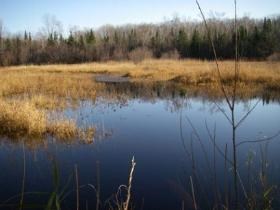For those of you needing a reprieve from the news on Coronavirus, check out what’s hitting HRWC inboxes. Read about efforts across the Huron River watershed to promote improved water quality as well as a new study underscoring the significant economic value of wetlands.

Study finds staggering economic benefit from protecting wetlands
A new study from the University of California, San Diego found that the ecological services provided by a square kilometer of coastal wetlands are worth an average of $1.8 million per year. The analysis cross-compared wetland coverage to storm damage in Atlantic and Gulf communities and found that areas with larger wetlands suffered lower property damage costs. This study is further evidence for the importance of protecting natural areas in our watershed.
Efforts underway to identify and control frog-bit in Oakland County
The Oakland County Cooperative Invasive Species Management Areas (CISMA), a partnership of over 40 local organizations and governments, recently received a $205,200 grant from the Michigan Invasive Species Grant Program to conduct frog-bit surveys across the county, including the headwaters of the Huron River. The Oakland County CISMA will work collaboratively with local partners, including the Huron River Watershed Council, to identify and control European frog-bit, an invasive aquatic plant already found in areas of Southeast Michigan.
Michigan likely needs realtor buy-in to pass a septic code
Still the only state in the nation without a statewide septic code, Michigan remains conflicted on the issue. While many local municipalities use point-of-sale inspections to reduce leaky septic systems, some interest groups oppose these programs citing issues with enforcement and real estate transaction delays. HRWC encourages septic system owners to practice routine maintenance and supports statewide regulation on this issue in an effort to limit pollution to waterways and groundwater.
Environmental town hall tackles many Downriver issues – McLouth Steel, PFAS and rising water levels
At a late February town hall in Trenton, hosted by U.S. Rep. Debbie Dingell, more than 150 people gathered to express concerns and learn more about a range of environmental issues affecting Downriver residents, such as PFAS, air contamination, and algal blooms. Staff from the State Department of Environment, Great Lakes, and Energy as well as the Environmental Protection Agency answered questions and listened to constituent concerns.
Ann Arbor finally kicks off pedestrian stormwater tunnels at railroad tracks
The City of Ann Arbor broke ground on its multi-faceted Allen Creek Railroad Berm project in mid-February. The project will reduce floodwater contamination to the Huron River near Argo Pond and provide a tunnel for pedestrians to safely navigate the area near Depot Street and the river. The project is set to be completed in late September.



